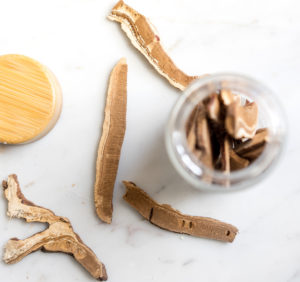TINCTURES 101
What They Are, How They Work & How To Take Them

If the word tincture is completely foreign to you, don’t worry we’ll help you out. Sometimes, navigating the terms and vocabulary of non-western medicine can be hard, so here’s a quick run down of what you need to know.
What Are Herbal Tinctures?
In short, an herbal tincture is a highly concentrated liquid solution made from herbs, water, and alcohol, which is necessary for the formulation process. Essential they liquids composed of the active compounds extracted from the herbs.
What Formulas Are Used In Tinctures?
There are nearly limitless combinations of herbs, but practitioners will recommend a formula specific to your body and goals. Unlike Western medication which is geared toward fixing or masking a specific symptom, Eastern medicine looks are your entire body to determine what underlying imbalances are causing your issues. The recommended tincture then works to rebalance your body, and then maintain said balance. That’s why tinctures are taken on an ongoing basis, though the formula might be edited over time to adjust for your changing body and needs.
Why Tinctures Instead of Other Types Of Herbs?

Herbs are rich in protective polyphenols, which help fight and prevent diseases like cancer, heart disease, Alzheimer’s, diabetes and more. Polyphenols are also anti-microbial, which helps protect you from harmful bacteria as well.
But, the studies that show the health benefits of herbs usually use concentrated solutions of the herbs’ active components, so you won’t get the same benefit just by eating raw herbs or steeping a small amount in your tea.
That’s where tinctures come in. They are highly concentrated combinations of herbs formulated specifically for your needs. Liquid extracts have faster absorption rates and are more easily digestible. According to Physician’s Desk Reference, your body absorbs 85 – 90% of nutrients in liquids within 22 to 30 seconds. However, your body only absorbs 10 – 20% of the nutrients contained in a pill.
Tinctures and extracts are very concentrated, so you usually only need a dropperful or two for an effective dose (depending on what you’re taking). That said, you take them by dropping them under your tongue. Yes, you won’t get as much of the bitter aftertaste, but this also helps the herbs enter your bloodstream faster than if you drank a diluted cup of tea or took a pill.
How Do You Take Tinctures?
Many people take it sublingually (a fancy word for under the tongue) because it absorbs quickly into the bloodstream. You can also mix your tincture with some hot water to help activate the compounds, but dropping it in a smoothie or anything similar works too. One word of warning, they don’t taste great, but most people say they do get used to it. In order to keep the tinctures pure, concentrated and effective, there aren’t any additives so they do have a bitter taste.
 How We Make Our Tinctures
How We Make Our Tinctures
Our tinctures have three main ingredients: herbs, distilled water & alcohol. For our alcohol, we use California produced grape spirits. It starts at 170-190 proof and has 0ppm total dissolved solids.
For our water, our filtration system utilizes reverse osmosis and deionization to produce water with less than 10ppm total dissolved solids. Some formulas include organic honey. It helps to mitigate the bitterness of some herbs and it emulsifies the high amount of solids in our extracts to keep them in solution.
Our herbs are finely ground prior to the extraction process. Our closed loop system gently warms the herbs and solvent and pushes the solution through the herbs. Utilizing traditional formulas and modern methods, we coax the active ingredients out of herbs without losing anything in the extraction process, resulting in the most concentrated solution available. Then, we bottle this goodness in handblown glass bottles in California.
Newer
The TCM Take On Lyme Disease
Older
What Your Lips Are Telling You According To Eastern Medicine
Comments (0)
Leave a reply
You must be logged in to post a comment.




